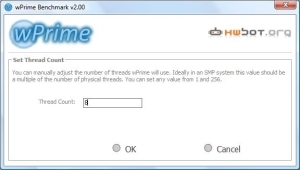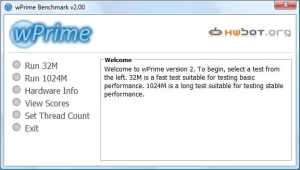WPrime32M
Website: WPrimeWPrime is a multi-threaded maths calculation benchmark that counter-intuitively uses square roots rather than prime numbers. The standard benchmark uses 32 million numbers, calculating the square root via 'a recursive call of Newton's method for estimating functions'.
We're not entirely sure what that means either, but you can read the full blurb on WPrime's About page. What we do know is that WPrime scales well across multiple CPU cores, and can push a CPU to 100 per cent load on all its cores.
To run the benchmark, first visit the core count to check that WPrime will load all physical and logical cores, and then run the 32M test.
The results are expressed as a time taken to calculate the square root of the set of numbers (32 million in the standard test). A lower score is better.


For explanation of what these numbers mean, head to the Conclusion.
Folding@home
Website: Stanford UniversityFolding@home is the most successful distributed computing application at the moment, starting off life on CPUs and then spreading to GPUs in recent years.
Folding is a client-based distributed computing application that simulates protein folding to aid our understanding of complex diseases such as Alzheimer's, Mad Cow Disease (BSE), CJD, ALS, Huntington's, Parkinson's disease, and many Cancers and cancer-related syndromes. To add some interest to the furthering of scientific and medical research doesn't hold any interest for you, Stanford also has team- and user-based leaderboards, so folding is also a competition.
There are various folding clients available, depending on what hardware and software you are running. To make the full use of the workstation/server CPUs being tested we ran the SMP CPU client with the bigadv switch natively in Linux.
The client downloads work units (aka 'projects') from Stanford, and each work unit is worth a certain amount of points. We then monitor how long the client takes to fold several per cent of a work unit and from this calculate how many points per day the client will complete.
You can join the bit-tech and Custom PC folding team (currently ranked sixth in the world) by using the team number 35947. Your contribution is valued.

For an explanation of what these numbers mean, head to the Conclusion.

MSI MPG Velox 100R Chassis Review
October 14 2021 | 15:04









Want to comment? Please log in.